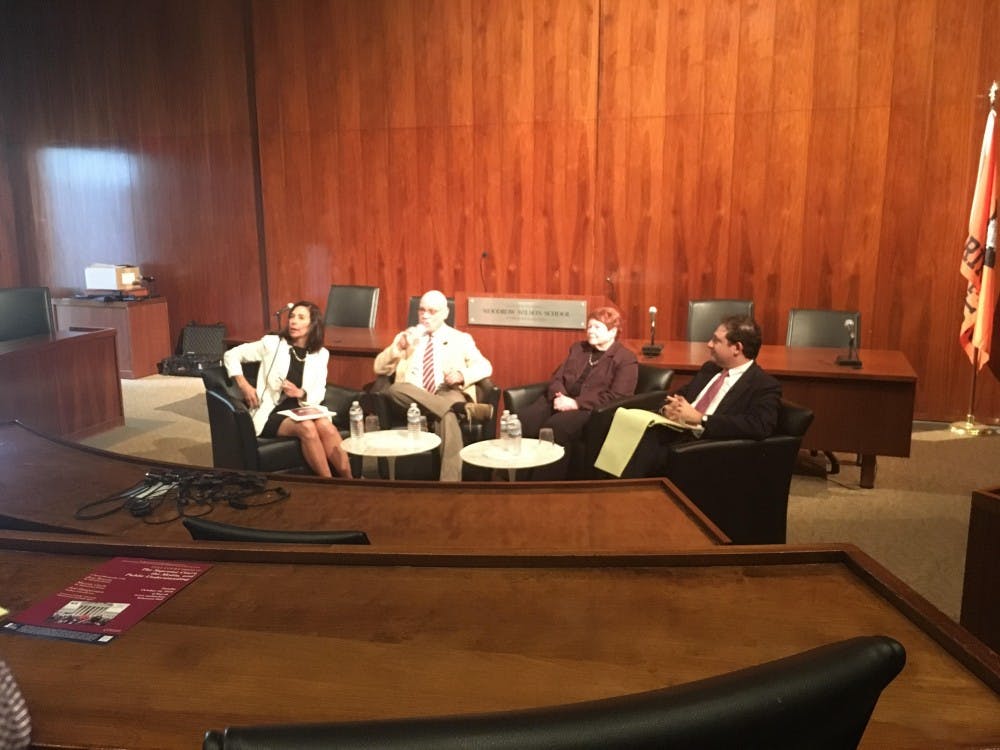On Tuesday, the Program in Law and Public Affairs hosted a lecture on the Supreme Court and the media. The panel featured Jess Bravin, an award-winning Supreme Court correspondent for The Wall Street Journal; Marcia Coyle, author and Chief Washington Correspondent for The National Law Journal; and Jed Shugerman, historian and professor at the Fordham University School of Law. Leslie Gerwin, associate director of the LAPA program, mediated the panel.
The focus of the discussion immediately turned to the newly nine-justice Court.
Bravin described his experience sitting in on the Court as surreal.
“Crossing Constitution Avenue from the Senate building to the Supreme Court feels like stepping off on Mars,” Bravin said. “The Supreme Court is operating as if hermetically sealed from the outside world. Kavanaugh is treated as if he’s been there for a thousand years, as if everything that took place right across the street never happened.”
Most of the justices are highly disappointed by the current politicization of the Court, with the three most recent nominations having faced Congressional turmoil, Bravin said.
He advised news consumers to step back and watch for the big picture of structural shifts in the Roberts Court in the coming months.
“The cases on the docket may be rather mild, but they can give us insight into how Kavanaugh and Gorsuch approach certain issues,” Bravin said.
Shugerman said that he has already noticed early signs of divergence between Gorsuch and Kavanaugh. While Gorsuch embraces libertarianism, Kavanaugh embraces executive power.

Shugerman said he hopes that the former continues while he fears that the latter intensifies.
Coyle spoke about the importance of watching for shifts in the behavior of the other justices as they adjust to the dynamics of the new Court.
“I think Roberts might revert to how he was when he first became Chief Justice,” Coyle said. “Lots of small steps before big steps.’”
Justices Kagan and Breyer, according to Coyle, will likely continue to make efforts toward compromise and consensus, and will avoid writing narrow decisions, as they have done over the past year in the absence of a ninth justice. Ginsburg and Sotomayor, however, will likely be less willing to move to the center, Coyle said.

As for Justice Thomas, Coyle struggled to label him as either radical or revolutionary. According to Coyle, Thomas has called for revisiting well-established legal precedents and doctrines six times in the past year alone.
“Thomas is always throwing these bombs out there,” Coyle said. “Now with a clearly conservative Court, I wonder if any of them will take hold.”
As for strategizing a Democratic response to the conservative Court, Shugerman set a bright-line rule.
“I think any solutions that require constitutional amendments should be off the table,” Shugerman said.
Thus, he advocated against the proposed idea of imposing term limits. Nowhere, however, does the Constitution specify the number of justices, Shugerman said, while arguing for a larger Court.
“I think nine justices is too few in the 21st century,” he said.
He said that if Democrats take the Senate and House, they should add two more justices to the Court.
Additionally, Shugerman said, liberal attorneys should alter their argument strategies before the Court by incorporating originalism to a greater extent now than ever before.
Shugerman said that originalism ought to be reinterpreted as staying true to the “broad goals” of the founding fathers. Coyle disagreed, saying the terminology could lose its meaning, rendering every legal thinker a so-called “originalist.”
Coyle left the audience with one request: “Vote, register, and vote.”
She discouraged students from taking a dismissive attitude about elections and stressed the massive long-term consequences of appointments to the Supreme Court.
The panel discussion, entitled “The Supreme Court, the Media, and Public Understanding,” took place at 4:30 p.m. on Oct. 16 in the Arthur Lewis Auditorium of Robertson Hall.








